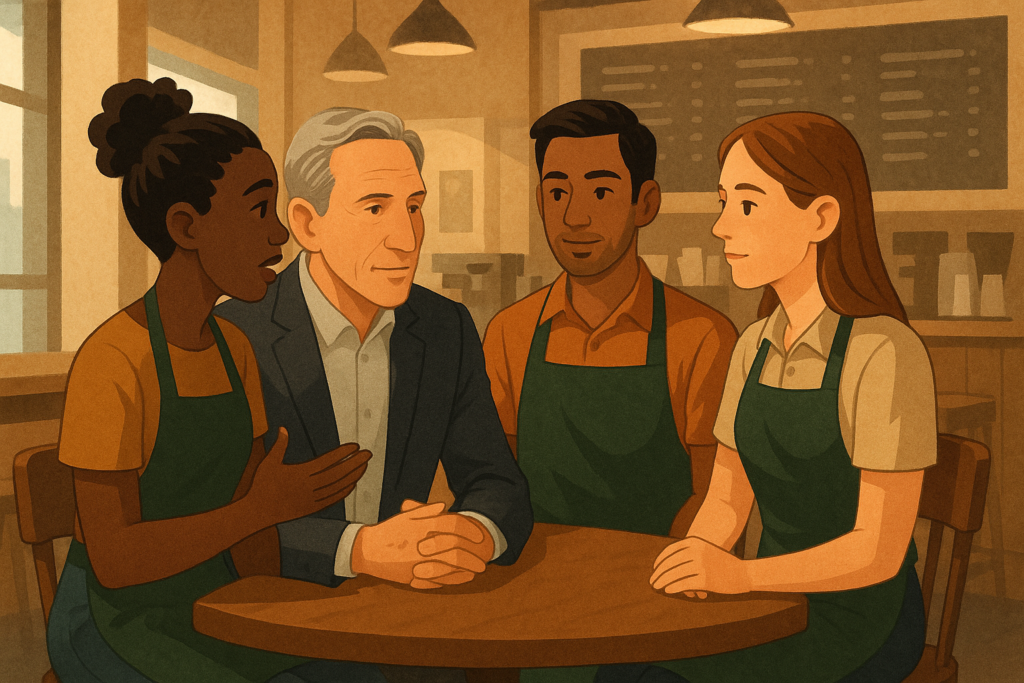Lesson 1B Activity – Global Version
Activity – Story: Howard Schultz and the Creation of an Inclusive Workforce at Starbucks
Show the picture below.
Howard Schultz grew up in a low-income housing complex in Brooklyn, New York. As a child, he saw how poorly his father was treated in the workforce—he worked low-wage jobs without healthcare or dignity, and when he was injured on the job, he was fired without support. This early experience shaped Schultz’s deep belief in dignity and equality in the workplace.
Years later, as CEO of Starbucks, Schultz used his leadership position to listen actively to his employees—whom he called “partners”—and ensure they were treated with respect and fairness. One of his most groundbreaking policies was offering full healthcare benefits even to part-time employees—something very rare in the U.S. service industry. This decision came after listening to baristas and learning how many were struggling to access healthcare while juggling school, second jobs, and family responsibilities.
He also prioritized listening sessions across the company where workers at all levels could share their challenges and ideas. For example, during a racial equity crisis in the U.S., Schultz led open forums where employees could speak freely about their experiences with discrimination. One barista’s story about being unfairly treated by a customer sparked a company-wide initiative on bias training and inclusion.
To learn more, see https://www.help.senate.gov/imo/media/doc/2023-03-29%20Statement%20of%20Howard%20Schultz.pdf
Questions
Invite students to gather in small groups and each take a turn answering one question. Encourage them to practice active listening.
- Why do you think active listening is important for leaders in a workplace?
- What problems might a company have if leaders don’t listen to employees?
- What are some ways employees can speak up about inequality or unfair treatment at work?
- If you were a boss, how would you make sure everyone at work felt heard and treated equally
- How does this story relate to respecting the rights of others? (Discuss this last question as a class)

Lesson 1 Activity – India
Activity: Poster Making
To illustrate these principles, the teacher conducts an activity by dividing students into groups.
The theme of right to equality was given to the students based on which each group was instructed to make posters. They were allowed to use the only provided stationary followed by group presentations.
While all the groups are given ample resources to complete their posters one group is exempted from being provided with them . *The students were also allowed to borrow resources from other groups as and when needed.
Finally the best presentation was rewarded.
Lesson 1 Activity – India
Activity – Story: Dreams
Long ago, in the country of South Africa, people lived under a cruel system called apartheid. Under apartheid, people with white skin had all the power and rights, while people with dark skin were treated unfairly. They could not go to the same schools, hospitals, buses, or even sit on the same benches as white people.
Nelson Mandela was a leader who fought against apartheid in South Africa. He became the country’s first Black president and a global symbol of peace and justice
But one man stood up and said, “This is wrong. All people are equal, no matter what their skin color is”.
His name was Nelson Mandela.
Mandela was a young lawyer who dreamed of a country where everyone was treated equally. He gave speeches, led peaceful protests, and tried to bring people together. But the government didn’t want change. They arrested him and put him in prison for 27 years—longer than some people live their whole childhood!
Even from his prison cell, Mandela never gave up hope. He believed that one day, black and white people would live as equals in the same land. People across the world supported his dream. Finally, after many years, the unfair laws were ended, and Mandela was freed.
Not only was he released, but he became the first black President of South Africa. He forgave those who had hurt him and said,
“No one is born hating another person. People must learn to love, for love comes more naturally to the human heart.”
Lesson 1 Activity – India, Additional Activities
Activity – Story: Dreams
Objective: Turn the lens inward—where do students see bias?
Task:
1. Ask students to anonymously post answers to:
2. Where do I see inequality in school or society?
3. When have I treated someone unfairly?
4. What can I do to be more fair?
Result: A visual collage of honest reflection, with opportunities to anonymously discuss responses.
Lesson 1 Activity – India, Additional Activities
Activity: Equality Journal – A Week of Watching
Objective: Build awareness through personal observation.
Task: Over 7 days, students maintain a journal with entries on:
Instances where they observed inequality (school, media, home, public).
Follow up Questions:
How they felt about it, What could have been done differently?
Reflection Prompt:
“Did anything surprise you about what you noticed this week?”
Lesson 1B Activity – Colega Secondary Manual
Activity: Equality Starts With Me – Critical Reflection Board
Kenyan runner Abel Mutai was in a big race in Spain. He was only a few meters from the finish line, but he got confused with the signs in Spanish, and he stopped, thinking he had finished the race. Spanish runner Ivan Fernandez was right behind him and recognized that Abel was confused. Ivan started shouting to Abel Mutai to keep running. However, Abel did not know Spanish and did not understand. Realizing what was going on, Ivan pushed Abel
across the finish line to victory.
A reporter asked Ivan, “Why did you do this? You could have won the race.”
Ivan replied, “My dream is that one day we can all be winners.”
The reporter insisted, “But why did you let the Kenyan win?”
Ivan replied, “I didn’t let him win. He was going to win. The race was his.”
“But you could have won!” the reporter argued.
Ivan looked at him and replied, “But what would be the honor of my victory? He was the rightful winner. What would my mother think if I didn’t help my friend?”
https://www.fairplayinternational.org/honesty-of-the-long-distance-runner
Questions
- Do you think both runners wanted to win the race? How do you know?
- Why did Ivan push Abel ahead of him to win the race?
- What are important things to remember when you race?
- Why is winning not always the most important thing?
- What would you have done and why?
- How does this story relate to respecting the rights of others?
Lesson 1B Activity – Colega Primary Manual
Activity: Class Rules
Before we talk about human rights, we need rules to help us have an orderly class.
While using the Talking Stick, ask what rules would you like to have?
Quickly write all the ideas on the board or paper so you can prepare a simple Class Rules chart to be displayed each week. From their list, allow students to choose no more than four rules that they like best. Encourage words such as respect and responsibility. Here are some ideas:
- Listening: Our Talking Stick makes us aware of how we listen to each other—something very important in our class. That means that all eyes and ears are focused on the speaker!
- Respectful language: Use words that aren’t mean or disrespectful to other people.
- Following: Listen carefully to the facilitator and follow directions.
- Punctuality: Try to be to class on time.

